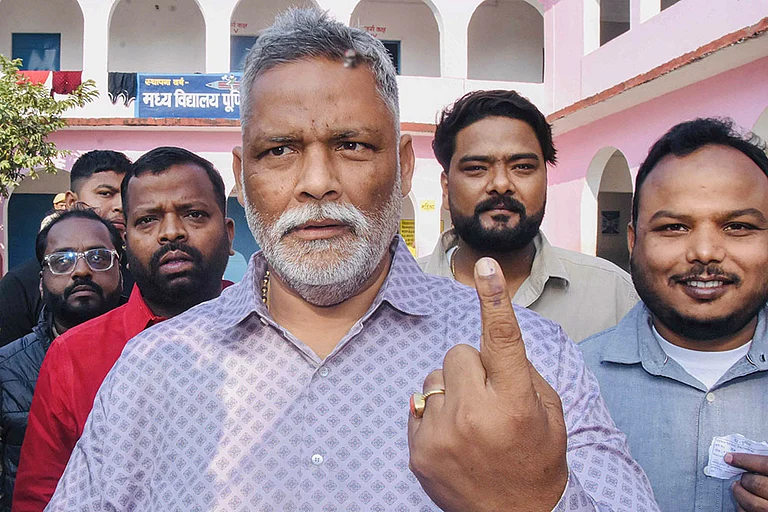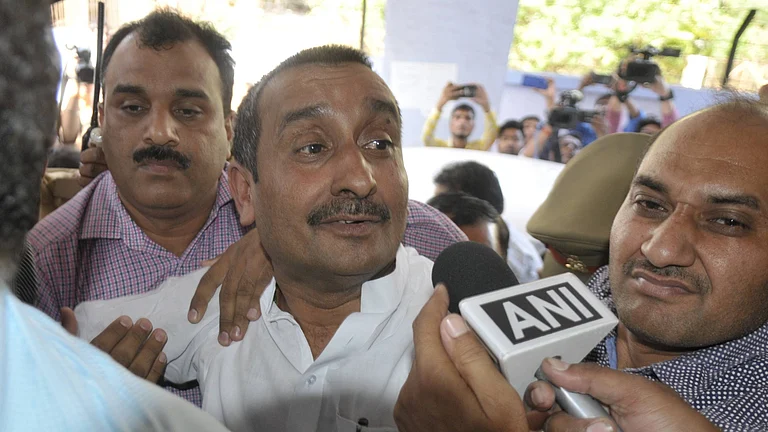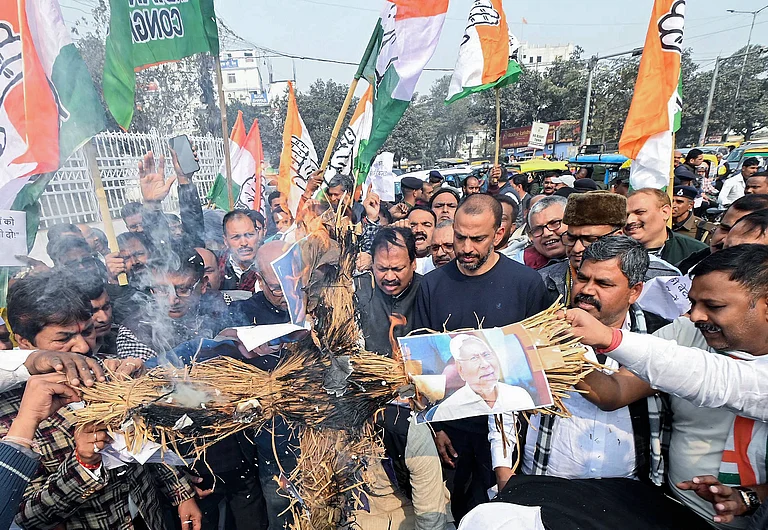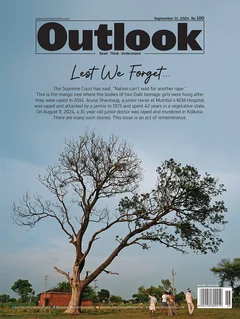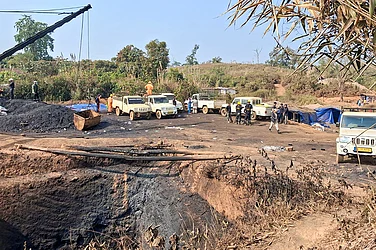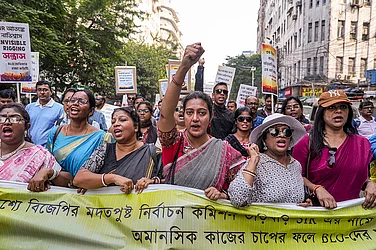This is the cover story for Outlook's 11 September 2024 magazine issue 'Lest We Forget'. To read more stories from the issue, click here
On July 3, 1999, the bodies of a 23-year-old woman, who studied at Patna Women’s College, and of her boyfriend were found in a semi-naked state in a car in a bungalow’s garage in the city. The gruesome incident sent shock waves across Bihar. Even after various pieces of evidence like semen stains of more than one person on the woman’s clothes in the forensic examination and postmortem report and injuries indicated that she was gang-raped and murdered, the Patna police had reportedly claimed it was a suicide. The efforts to suppress the case were attributed to the fact that the names of former Chief Minister Rabri Devi’s brother Sadhu Yadav and other politicians had surfaced in the incident. Later, the case was transferred to the Central Bureau of Investigation (CBI), which after four years of investigation, also concluded it to be a suicide. Factors such as a then-MLA’s (believed to be Sadhu Yadav) denial to provide his DNA sample demanded for investigative purposes and unanswered questions about who informed the police about the bodies lying in the garage were put in cold storage. In 2006, when the demand to reopen the investigation was made, the woman’s brother was kidnapped, adding to the suspicions already surrounding the investigation. It is widely believed to have been wrongly concluded without the conviction of the perpetrators of the crime.
When asked about his kidnapping and the connection to the demand to reopen the case, the victim’s brother said, “I am not aware of who had kidnapped me and why. I only know that they had taken me to a place in Raghopur Diara (located in Bihar’s Vaishali block) and later freed.” Recalling his sister’s tragic death, he said, “The motive with which the culprits destroyed my sister’s life was lust. Many women and girls, including the victim of the recent alleged rape-murder incident in Paru, Muzaffarpur, continue to fall victim to someone’s lust. The government’s cover-up of such instances and lawlessness are the reasons why such heinous acts of sexual violence keep happening in our state.”
The 1999 Patna case victim’s former neighbour says that the news about her body being found in such a humiliating state felt like a personal loss. The gruesome incident has not faded from his memory 25 years later. He remembers her as a bright, ambitious young woman whose whole future was cruelly snatched away. He vividly recollects being a part of the widespread protests in Patna this incident had triggered in 1999.
When contacted, Rajkumar Karn, who was appointed the case Investigation Officer, Bihar Police for the case before it was handed over to the CBI, told this reporter, “I am getting to hear about the final CBI report in the case being produced in court on August 1, 2023 from you. We never got the final report.”
The 1999 Patna case victim’s former neighbour says that the The gruesome incident has not faded from his memory 25 years later. He was a part of the widespread protests this incident triggered.
Paru Rape and Murder Case, August 2024
In the Paru case, which the Patna case victim’s brother is referring to, a girl hailing from the Dalit community was allegedly kidnapped from her house late on August 11, 2024 . The next day, her body was found in a shallow water body. The FIR in the case alleges murder and gang rape. The case also prima facie establishes that the incident took place in her village Lalu Chhapra in Paru, Muzaffarpur. As per initial news reports, the girl was injured with a knife and a shovel several times on her private parts.
There were protests across Bihar after the incident came to light. So far, the Bihar Police has arrested five accused, namely Sanjay Rai (Yadav), Pankaj Ram, Mithilesh Kumar, Chunnu Paswan and Munna Ram in the case. Sanjay, who was named by the victim’s family in the FIR is the prime suspect for her murder. The victim’s family has fled to another city in Bihar fearing further harm from people connected to Sanjay.
Meanwhile, one of Sanjay’s neighbours called the crime “an outcome of an inter-caste affair between the girl and Sanjay”. He also attempted to dub it as an incident of honour killing by the girl’s family, even though no investigation has hinted at such a possibility.
Sanjay’s house, close to the victim’s home in the village, has been demolished. The villagers say it was done by an angry mob led by Bahujan Army’s Golden Das who came to the village with thousands of people a few days after the incident.
While the initial news reports in the case had noted the girl’s age as 14, when Outlook visited her school in the village where she had studied till Class 5, her year of birth was found to be 2005, making her age at the time of her death 19.
The girl’s mother who is in hiding along with 15 of her family members says, “A few days before the incident, Sanjay came to me and said he wanted to marry my daughter. When I refused saying I will marry her off to someone in our community, he threatened me with dire consequences and left.”
Patna-based women’s rights activist Kanchan Bala says that of late, Muzaffarpur has emerged as a hub of incidents of harrowing violence against women.
She shudders when she remembers how blood was oozing out from her daughter’s private parts when her body was found. The girl’s sister-in-law, who is inconsolable, demands nothing “lesser than capital punishment for the culprits including Sanjay.” She says the family “will fight till the end not only for justice but also because we fear these people will kill our entire family if we go back to the village.” They allege that before this incident, the accused party’s people had murdered two more members of their family—the girl’s elder brother and her elder sister’s husband.
Patna-based women’s rights activist Kanchan Bala says that of late, Muzaffarpur has emerged as a hub of incidents of harrowing violence against women. “I have also observed that even when a case is transferred to the CBI in the case of Bihar, it is often concluded in such a manner that reflects the evidence of rape and murder were ignored in the investigation,” she points out. “ Many a time, the case is conveniently regarded as a suicide. Sometimes, the postmortem report is also changed in the course of the case investigation.”
Her kin maintain that the injuries found on her body (especially her private parts) hinted that she was brutally raped. However, Muzaffarpur SSP Rakesh Kumar claims that the injuries were only seen on her limbs and face and thus any chance of gang rape could be ruled out.
The fact that later on in the investigation in the 1999 Patna rape-murder case the semen marks found on the victim’s clothes in the postmortem report were regarded as sweat marks, bears testimony to the possibility of such investigations being faulty. A Patna-based woman activist said on condition of anonymity that even the reliability of postmortem tests is under question in Bihar at times. She had once come across a lady doctor in the state, who told her that she refrains from writing about evidence of rape to avoid court appearances when the case would go to trial.
The fact that the system at all levels does play a role in covering up sexual offences even after an accused is arrested is evident from the fact that Vandana Gupta, superintendent of a Patna-based government care institution, who was jailed in connection with the charges of rape of the Home’s inmates and the ITPA (Immoral Traffic (Prevention) Act), 1956 has been reappointed to a post in another care institution outside Patna after getting bail. This development was confirmed by Meenu Kumari, the lawyer representing the victims and survivors of the Gai Ghat Remand Home case of 2022.
Gai Ghat Remand Home Case, 2022

Gupta—named as the main perpetrator in the case—was booked under Sections 354 A (sexual harassment) and 450 (house-trespass) of the Indian Penal Code.
In January 2022, an inmate of the Gai Ghat Remand Home escaped and tried to lodge complaints against the home’s superintendent with the help of activists from the Mahila Vikas Manch in Bihar, which brought the case to light by holding a press conference in Patna. But the Patna police had refused to lodge an FIR at first. After this, another inmate from the Home also made serious charges against its superintendent. The inmates’ complaints were registered at the women's police station only a month later on February 3 when the Patna High Court took suo moto cognisance of the case.
A nine-member special investigation team led by ASP (Sachivalay) Kamya Mishra was formed to probe the allegations against the Gai Ghat Home authorities. “The High Court in a statement called the investigation shoddy. We have made a plea for a CBI inquiry in the case,” says Kumari.
In medical tests, several of the Home inmates were found drugged and with cut marks and injuries at various places on their bodies. In one of the video statements of a survivor, she says that the girls in the Home were often subjected to sexual exploitation both by the staff of the Home and outsiders.
Araria and Gaya Rapes
A contrast could be drawn between two cases—one from Araria district in which the rape survivor’s determination to fight for herself led the authorities to go to the extent of punishing her instead of taking steps to provide her justice. The other is from a remote village in Gaya district where the fear of dire consequences led the rape survivor’s family to strike a compromise and flee from their home forever due to fear.
Irony died a thousand deaths when a local court in Araria in July, 2020 sent a rape survivor to jail for contempt of court and ‘‘obstructing government servants from discharging their duty’’, among other charges. This was days after the woman in her 20s had lodged an FIR at Araria women’s police station, alleging she was gang-raped on July 6. When she was asked to record her statement before a magistrate, the police stated that she had appeared with two social workers from the NGO Jan Jagran Shakti Sangathan. It was alleged that she raised her voice and refused to sign the statement, until it was read out to her. Later, an FIR was registered against the three women—the survivor and the two social activists and in it was mentioned that the accused “insulted the presiding officer” by allegedly misbehaving with him.
Irony died a thousand deaths when a court in Araria in July, 2020, sent a rape survivor to jail for contempt of court and ‘‘obstructing government servants from discharging their duty’’, among other charges.
All three women were released on bail soon after but only the case against the rape survivor was quashed. A Supreme Court order from February 2024 in the case stated: “The (Patna) High Court declined to quash the said order of the Chief Judicial Magistrate taking cognisance in the impugned order passed on 21.04.2022 in a petition brought by the appellant under Section 482 of the Code [Code of Criminal Procedure]. Considering the fact that the appellant herself claimed to be a victim of sexual assault, we do not think in the interest of justice, the proceeding against her ought to be continued. A sympathetic approach ought to be adopted in a matter of this nature, where there can be certain element of overreaction from a traumatised victim. We, accordingly, set aside the impugned order of the High Court and quash the order taking cognisance of offence qua the appellant. We are apprised that charge sheet has been submitted in the said case. The charge sheet, qua the appellant shall also stand quashed.”
One of the activists from Jan Jagran Shakti Sangathan, who still awaits the charge against her to be quashed, says, “What the police had found most offensive about the rape survivor was her courage. It had hurt their patriarchal mindset. The woman was learning to ride a bike from her male friend at the time she was picked up by four unknown men and raped. She was standing bravely at the police station to fight her rapists. And this hurt them much more than the heinous crime committed against her. They were in more of a hurry to punish her for being courageous and her friends for helping her to make herself heard. They were not in so much of a hurry to identify and punish her rapists. This is our police and the real face of the patriarchal society in the state.”
The Araria Mahila police had no comments on the matter and no information about the rapists.
In Gaya, an Adivasi woman who was allegedly gang-raped in Patwas village, approached Gurpa Mahila police station on May 9, 2022. An FIR was filed at the station against the two accused, namely Ashok Manjhi and Dharmraj Manjhi of the same village. The police confirmed that a chargesheet was also filed. However, when Outlook attempted to reach the rape survivor’s family, a villager called Mangra Munda said that while the accused was in jail, they kept sending threats to the survivor’s family.
According to Munda, later, after this, a compromise was struck between the survior’s family and the accused party in a local court. “The case was quashed and the survivor along with her husband, whose family had migrated to Patwas from Khunti in Jharkhand in 2000, abandoned the village and returned to Jharkhand out of fear.”
The village mukhiyapati Ranjeet Kumar, who is a proxy for the actual village Mukhiya (village head) Sarita Kumari, also confirmed the news about the compromise between the two parties.
Patna-based activist Priyadarshi says that when he was informed about the compromise, he had advised the Adivasis in the village to not do so, but he was later informed that they went ahead because the accused was constantly threatening the survivor’s family.
Still Waiting for Justice
In 1987, cases of violence against women in Patna had led thousands from institutes such as Patna Women’s College, Magadh Mahila College, JD Women’s College, among others, to take out a large procession up to Gandhi Maidan. “There were two incidents of killings of women under mysterious cirucumstances in the city that had shaken our collective conscience and particularly left the women very angry,” says Sudha Varghese, who was an active member of the Balatkaar Virodhi Manch formed by women’s rights groups in Bihar in the early ‘90s. “Even the heavy rains that kept lashing the state capital all day long did not make the crowd disperse and they kept shouting slogans demanding justice for the victims,” she remembers.
MORE FROM THIS ISSUE
The demands for justice continue. It has been a long wait for Bihar’s women.







